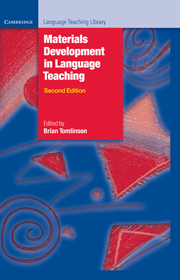Book contents
- Frontmatter
- Contents
- Preface
- Glossary of basic terms for materials development in language teaching
- Acknowledgements
- 1 Introduction: principles and procedures of materials development
- Part A Data collection and materials development
- 2 Using corpora in the language classroom
- 3 Concordances in the classroom without a computer: assembling and exploiting concordances of common words
- 4 Telling tails: grammar, the spoken language and materials development
- Comments on Part A
- Part B The process of materials writing
- 5 A framework for materials writing
- 6 Writing course materials for the world: a great compromise
- 7 How writers write: testimony from authors
- Comments on Part B
- Part C The process of materials evaluation
- 8 The analysis of language teaching materials: inside the Trojan Horse
- 9 Macro- and micro-evaluations of task-based teaching
- 10 What do teachers really want from coursebooks?
- 11 The process of evaluation: a publisher’s view
- Comments on Part C
- Part D The electronic delivery of materials
- 12 Developing language-learning materials with technology
- 13 New technologies to support language learning
- Comments on Part D
- Part E Ideas for materials development
- 14 Seeing what they mean: helping L2 readers to visualise
- 15 Squaring the circle – reconciling materials as constraint with materials as empowerment
- 16 Lozanov and the teaching text
- 17 Access-self materials
- Comments on Part E
- Conclusions
- Recommended reading
- Index
11 - The process of evaluation: a publisher’s view
Published online by Cambridge University Press: 09 February 2023
- Frontmatter
- Contents
- Preface
- Glossary of basic terms for materials development in language teaching
- Acknowledgements
- 1 Introduction: principles and procedures of materials development
- Part A Data collection and materials development
- 2 Using corpora in the language classroom
- 3 Concordances in the classroom without a computer: assembling and exploiting concordances of common words
- 4 Telling tails: grammar, the spoken language and materials development
- Comments on Part A
- Part B The process of materials writing
- 5 A framework for materials writing
- 6 Writing course materials for the world: a great compromise
- 7 How writers write: testimony from authors
- Comments on Part B
- Part C The process of materials evaluation
- 8 The analysis of language teaching materials: inside the Trojan Horse
- 9 Macro- and micro-evaluations of task-based teaching
- 10 What do teachers really want from coursebooks?
- 11 The process of evaluation: a publisher’s view
- Comments on Part C
- Part D The electronic delivery of materials
- 12 Developing language-learning materials with technology
- 13 New technologies to support language learning
- Comments on Part D
- Part E Ideas for materials development
- 14 Seeing what they mean: helping L2 readers to visualise
- 15 Squaring the circle – reconciling materials as constraint with materials as empowerment
- 16 Lozanov and the teaching text
- 17 Access-self materials
- Comments on Part E
- Conclusions
- Recommended reading
- Index
Summary
Introduction
In the original edition of this book Peter Donovan (Donovan 1998 ) looked exclusively at piloting as a way in which publishers evaluate material. Whilst this remains one of the ways in which materials are evaluated, it is no longer the main way that publishers do this. In this chapter I have tried to refl ect more broadly what the current practice is for evaluating materials and infl uencing their design for most ELT publishers. The comments contained within this chapter should be considered as my personal comments based on over 20 years in the world of ELT and ELT publishing. Whilst my recent experience is largely with Cambridge University Press, the comments may apply equally to other ELT publishers.
When the first edition of this book was published in 1998, the world of ELT and specifically ELT publishing was a very different place. We were just discovering the joys of task-based learning and using the relatively new teaching procedures offered by the communicative approach. To a certain extent the ELT panorama is more of a known landscape now, where teachers have had more exposure to different ideas, with the Internet providing access to more information and resources than ever before. Many teachers now know which method is effective in producing the desired outcomes for their teaching environment; this could be that a student can produce accurate or fl uent language in an appropriate register from a certain type of task, or internalises a grammatical rule better using language presented in a meaningful context. Teachers also know what sounds like a good idea but is actually unlikely to produce the desired outcomes with their class. Whilst it may well be true that there are still many inexperienced teachers who need basic guidance and more experienced teachers who need their convictions to be challenged, there is more information available to teachers than ever before; specialist magazines in ELT, professional conferences such as local IATEFL (International Association of Teachers of English as a Foreign Language), TESOL (Teachers of English to Speakers of Other Languages) and British Council conferences and ELT websites. These all offer information and an opportunity for teachers to discuss different ideas and approaches.
- Type
- Chapter
- Information
- Materials Development in Language Teaching , pp. 267 - 295Publisher: Cambridge University PressPrint publication year: 2011
- 13
- Cited by

